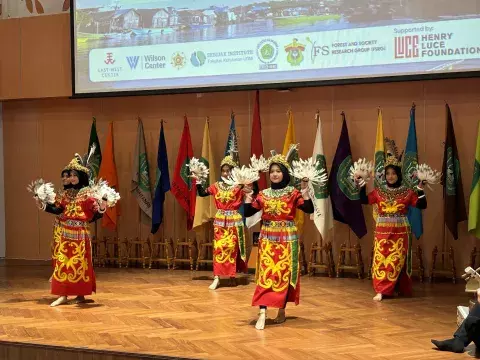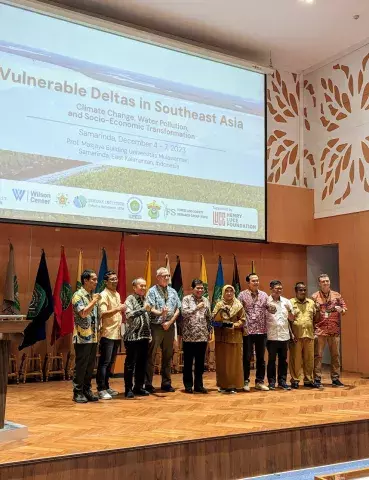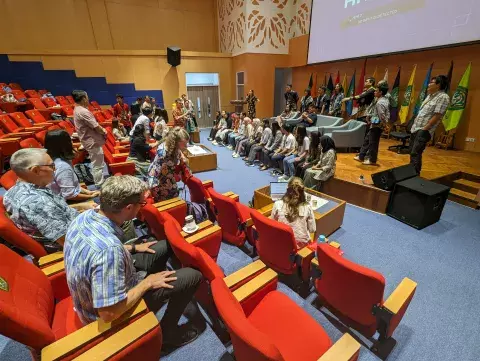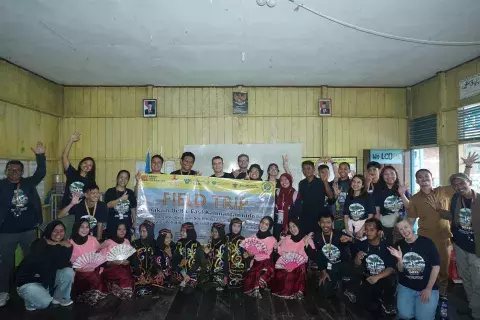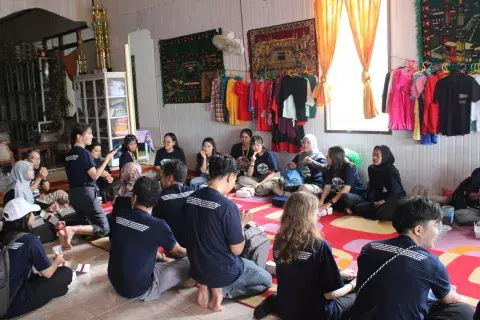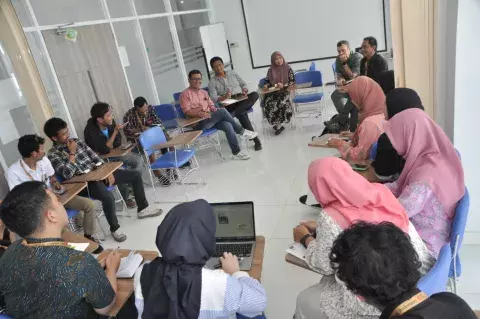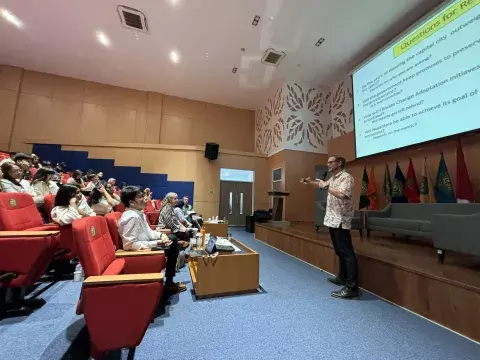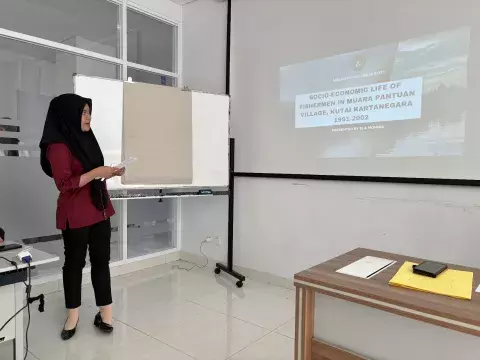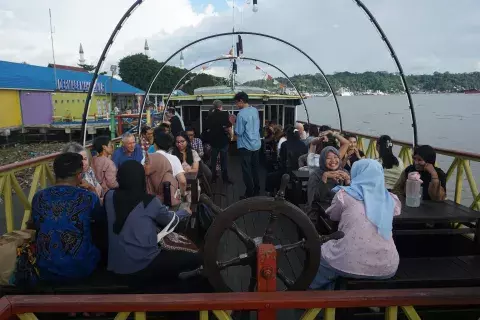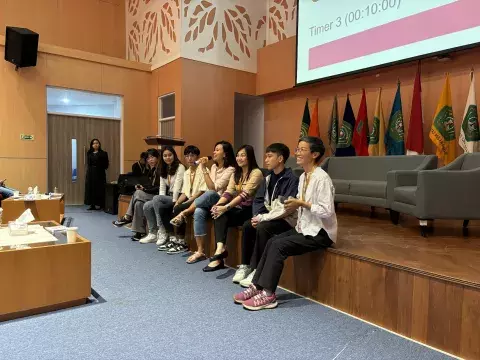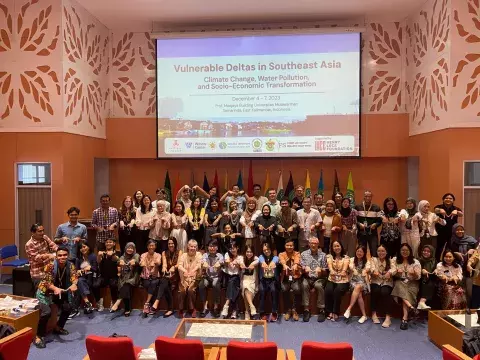Error message
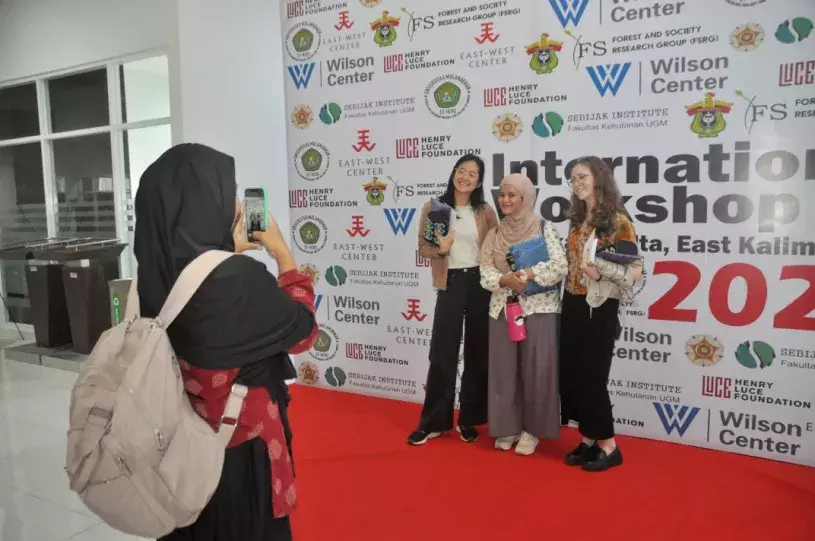
OFFICE/DEPARTMENT
Last December 4-7, 2023, researchers from East-West Center, in collaboration with the Wilson Center’s China Environment Forum (CEF), Chulalongkorn, Srinakharinwirot, Khon Kaen, Gadjah Mada, Mulawarman, Hasanuddin, and An Giang Universities, the Asian Vision Institute, and other local partners in Southeast Asia gathered in Samarinda, Indonesia to expand and deepen research and education networks on climate, environmental, social and infrastructure threats to deltas. This workshop was held as part of the Luce Foundation-supported project “Vulnerable Deltas in Southeast Asia: Climate Change, Water Pollution, and Socio-Economic Transformation,” and was attended by over 50 participants from 10 countries, ranging from academics, undergraduate and graduate students, civil society / community organizations, and policymakers. This is the second international workshop to be held as part of the project, following the first workshop that took place in Bangkok in December 2022.
Shannon Chambers (MA Student, Geography and Environment) and Ci Yan Sara Loh (PhD Candidate, Anthropology) are East-West Center Graduate Student Affiliates who attended the workshop, and share their experiences and reflections below.
Day 1
The workshop began with welcoming remarks and introductions from the Indonesia team’s PI, Prof. Dr. Ahmad Maryudi; the Rector, Universitas Mulawarman, Prof. Dr. Ir. H. Abdunnur; the Director of Environment and Disaster Management, Ibu Kota Nusantara, Dr. Onesimus Patiung; and the East-West Center’s Jefferson Fox and Micah Fisher. The welcome also included a beautiful Dayak performance from a Universitas Mulawarman student dance group, demonstrating just one example of the culture that exists in Borneo. Next, each country team (Indonesia team, Myanmar and Thailand team, the Mekong team, Thailand team, and the Wilson Center) presented their individual project updates and took questions. The breadth of these presentation topics were impressive and a strong introduction to the wide significance of the workshop themes that connected Southeast Asian river deltas (climate change, water pollution and socio-economic transformations). The afternoon wrapped up with small breakout discussions and the sharing of reflections on cross-cutting themes as well as the different approaches to research and issues in deltas. These reflections enriched this introduction to the workshop as we were able to gain insights into what other participants found interesting in addition to our own individual takeaways.
Day 2
Day 2 brought first-hand exploration and discovery to the workshop, bringing the workshop themes - climate change, vulnerability and resilience in deltas - from theory to reality. All participants made their way to one of two villages (Muara Pantuan and Tani Baru) located at the mouth of the Mahakam Delta. Traveling by motor boat, participants arrived to warm welcomes in their respective villages before separating into small groups to meet with various village groups or individuals to discuss diverse topics including small business enterprises, ponds, mangroves, local governance, education and youth organizations. Seeing the villages in person and directly interacting with the villagers at each site produced a new appreciation for these themes and their significance. Workshop participants later regathered for group discussions to share information and reflections from their respective conversations with the villagers. This experience in the field provided a chance for us to make connections between the workshop themes and the themes and topics related to our own individual research projects.
Day 3
After a debrief on the field trip, we heard from the CEF team about their Belt and Road Initiative (BRI) research across Southeast Asia. This was followed by student-led presentations in breakout rooms where students participants (including ourselves) practiced sharing our research in a friendly setting. It was a unique opportunity to field questions and receive valuable feedback from experts and fellow young researchers from the region, and definitely helped us think through our projects from broader, interdisciplinary perspectives. After lunch, Dr Ryan Longman (East-West Center) offered a climate scientist’s critical perspective on the “green” city plans of Nusantara, Indonesia’s future capital city, in a rapidly changing climate. This enriched our sense of place and kuleana, given the workshop location’s close proximity to the new capital. The next session was one of the most engaging and fun as everyone whipped out their phones or laptops to play “The Plastic Pipeline”, an online game made by the Wilson Center. It brought together the best of both worlds - learning facts on plastic pollution, and interactive gaming, and encouraged us to explore more creative and interactive ways to present our own research. We ended the day with country-group planning meetings and reflections.
Day 4
Participants continued country group planning meetings, followed by a series of “speed dating” sessions where research team member experts on publications, fieldwork, field schools, working with vulnerable communities shared their experiences and knowledge in intimate, interactive groups. As many of our fellow students echo in the video below, we are grateful for this rare chance to connect with and learn from the many senior and junior researchers present. We ended the workshop with reflections from these past 4 days, and suggestions for upcoming ones. That last evening, we were treated to a river cruise (with dinner and karaoke!) on the Mahakam river. While an opportunity to celebrate the conclusion of a successful workshop together, this final outing epitomized the themes we spent the week exploring as barges chugged along past us, transporting coal from mines upriver to the delta, then to their various destination countries.
Parting thoughts from EWC Graduate Student Affiliates
Shannon:
Participating in the Samarinda Workshop was inspirational, seeing researchers and scholars of varying levels of their careers - ranging from fully established to university students - come together from numerous countries around the world to share their own research and join in collaborations. For a young academic, this workshop represented an ideal that I was both honored to be a part of as well as grateful to have witnessed. Being gifted with this example of collaborative and innovative international research is an experience that allowed for me to see how my own work in Sulawesi is connected to the workshop themes of climate change, vulnerability, and resistance as well as understand these concepts through the scholarship and perspectives of fellow workshop participants.
Sara:
As a young researcher working with vulnerable river communities in Southeast Asia, this workshop was a valuable experience in how collaborative, cross-country projects allow for the sharing of comparative perspectives on and potential solutions to vulnerability, socio-economic transformations, environmental and climate change in the region. I enjoyed learning how different country contexts shaped the various delta community interpretations, experiences and resilience, and that despite these, regional similarities still allow for collaborative thinking and doing across borders. Having worked in Malaysian Borneo before, during this first trip to Indonesian Borneo, this was especially apparent during our field trip to the Delta Mahakam villages where the landscape, context, people and challenges, felt different yet still familiar. I look forward to applying these learnings in my own research in Southeast Asia going forward!
Meet some of the participating students and hear their insights and reflections on the 2023 Samarinda Workshop here! This video was made by our colleague, Pamula Mita Andary, from Forest and Society Research Group, Universitas Hasanuddin.
Shannon (MA Student, Geography and Environment) and Sara (PhD Candidate, Anthropology) are East-West Center Graduate Student Affiliates. They attended this workshop with support from the East-West Center, University of Hawai‘i at Mānoa, Sebijak Institute - Universitas Gadjah Mada, Forest and Society Research Group - Universitas Hasanuddin and Universitas Mulawarman.
Last December 4-7, 2023, researchers from East-West Center, in collaboration with the Wilson Center’s China Environment Forum (CEF), Chulalongkorn, Srinakharinwirot, Khon Kaen, Gadjah Mada, Mulawarman, Hasanuddin, and An Giang Universities, the Asian Vision Institute, and other local partners in Southeast Asia gathered in Samarinda, Indonesia to expand and deepen research and education networks on climate, environmental, social and infrastructure threats to deltas. This workshop was held as part of the Luce Foundation-supported project “Vulnerable Deltas in Southeast Asia: Climate Change, Water Pollution, and Socio-Economic Transformation,” and was attended by over 50 participants from 10 countries, ranging from academics, undergraduate and graduate students, civil society / community organizations, and policymakers. This is the second international workshop to be held as part of the project, following the first workshop that took place in Bangkok in December 2022.
Shannon Chambers (MA Student, Geography and Environment) and Ci Yan Sara Loh (PhD Candidate, Anthropology) are East-West Center Graduate Student Affiliates who attended the workshop, and share their experiences and reflections below.
Day 1
The workshop began with welcoming remarks and introductions from the Indonesia team’s PI, Prof. Dr. Ahmad Maryudi; the Rector, Universitas Mulawarman, Prof. Dr. Ir. H. Abdunnur; the Director of Environment and Disaster Management, Ibu Kota Nusantara, Dr. Onesimus Patiung; and the East-West Center’s Jefferson Fox and Micah Fisher. The welcome also included a beautiful Dayak performance from a Universitas Mulawarman student dance group, demonstrating just one example of the culture that exists in Borneo. Next, each country team (Indonesia team, Myanmar and Thailand team, the Mekong team, Thailand team, and the Wilson Center) presented their individual project updates and took questions. The breadth of these presentation topics were impressive and a strong introduction to the wide significance of the workshop themes that connected Southeast Asian river deltas (climate change, water pollution and socio-economic transformations). The afternoon wrapped up with small breakout discussions and the sharing of reflections on cross-cutting themes as well as the different approaches to research and issues in deltas. These reflections enriched this introduction to the workshop as we were able to gain insights into what other participants found interesting in addition to our own individual takeaways.
Day 2
Day 2 brought first-hand exploration and discovery to the workshop, bringing the workshop themes - climate change, vulnerability and resilience in deltas - from theory to reality. All participants made their way to one of two villages (Muara Pantuan and Tani Baru) located at the mouth of the Mahakam Delta. Traveling by motor boat, participants arrived to warm welcomes in their respective villages before separating into small groups to meet with various village groups or individuals to discuss diverse topics including small business enterprises, ponds, mangroves, local governance, education and youth organizations. Seeing the villages in person and directly interacting with the villagers at each site produced a new appreciation for these themes and their significance. Workshop participants later regathered for group discussions to share information and reflections from their respective conversations with the villagers. This experience in the field provided a chance for us to make connections between the workshop themes and the themes and topics related to our own individual research projects.
Day 3
After a debrief on the field trip, we heard from the CEF team about their Belt and Road Initiative (BRI) research across Southeast Asia. This was followed by student-led presentations in breakout rooms where students participants (including ourselves) practiced sharing our research in a friendly setting. It was a unique opportunity to field questions and receive valuable feedback from experts and fellow young researchers from the region, and definitely helped us think through our projects from broader, interdisciplinary perspectives. After lunch, Dr Ryan Longman (East-West Center) offered a climate scientist’s critical perspective on the “green” city plans of Nusantara, Indonesia’s future capital city, in a rapidly changing climate. This enriched our sense of place and kuleana, given the workshop location’s close proximity to the new capital. The next session was one of the most engaging and fun as everyone whipped out their phones or laptops to play “The Plastic Pipeline”, an online game made by the Wilson Center. It brought together the best of both worlds - learning facts on plastic pollution, and interactive gaming, and encouraged us to explore more creative and interactive ways to present our own research. We ended the day with country-group planning meetings and reflections.
Day 4
Participants continued country group planning meetings, followed by a series of “speed dating” sessions where research team member experts on publications, fieldwork, field schools, working with vulnerable communities shared their experiences and knowledge in intimate, interactive groups. As many of our fellow students echo in the video below, we are grateful for this rare chance to connect with and learn from the many senior and junior researchers present. We ended the workshop with reflections from these past 4 days, and suggestions for upcoming ones. That last evening, we were treated to a river cruise (with dinner and karaoke!) on the Mahakam river. While an opportunity to celebrate the conclusion of a successful workshop together, this final outing epitomized the themes we spent the week exploring as barges chugged along past us, transporting coal from mines upriver to the delta, then to their various destination countries.
Parting thoughts from EWC Graduate Student Affiliates
Shannon:
Participating in the Samarinda Workshop was inspirational, seeing researchers and scholars of varying levels of their careers - ranging from fully established to university students - come together from numerous countries around the world to share their own research and join in collaborations. For a young academic, this workshop represented an ideal that I was both honored to be a part of as well as grateful to have witnessed. Being gifted with this example of collaborative and innovative international research is an experience that allowed for me to see how my own work in Sulawesi is connected to the workshop themes of climate change, vulnerability, and resistance as well as understand these concepts through the scholarship and perspectives of fellow workshop participants.
Sara:
As a young researcher working with vulnerable river communities in Southeast Asia, this workshop was a valuable experience in how collaborative, cross-country projects allow for the sharing of comparative perspectives on and potential solutions to vulnerability, socio-economic transformations, environmental and climate change in the region. I enjoyed learning how different country contexts shaped the various delta community interpretations, experiences and resilience, and that despite these, regional similarities still allow for collaborative thinking and doing across borders. Having worked in Malaysian Borneo before, during this first trip to Indonesian Borneo, this was especially apparent during our field trip to the Delta Mahakam villages where the landscape, context, people and challenges, felt different yet still familiar. I look forward to applying these learnings in my own research in Southeast Asia going forward!
Meet some of the participating students and hear their insights and reflections on the 2023 Samarinda Workshop here! This video was made by our colleague, Pamula Mita Andary, from Forest and Society Research Group, Universitas Hasanuddin.
Shannon (MA Student, Geography and Environment) and Sara (PhD Candidate, Anthropology) are East-West Center Graduate Student Affiliates. They attended this workshop with support from the East-West Center, University of Hawai‘i at Mānoa, Sebijak Institute - Universitas Gadjah Mada, Forest and Society Research Group - Universitas Hasanuddin and Universitas Mulawarman.


